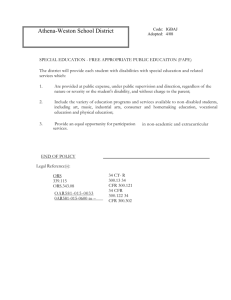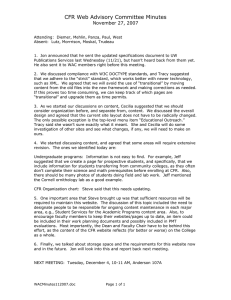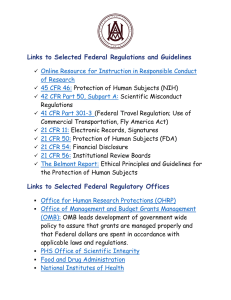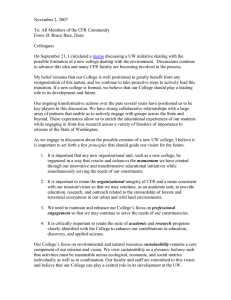UNITED STATES NUCLEAR REGULATORY COMMISSION OFFICE OF NUCLEAR MATERIAL SAFETY AND SAFEGUARDS
advertisement
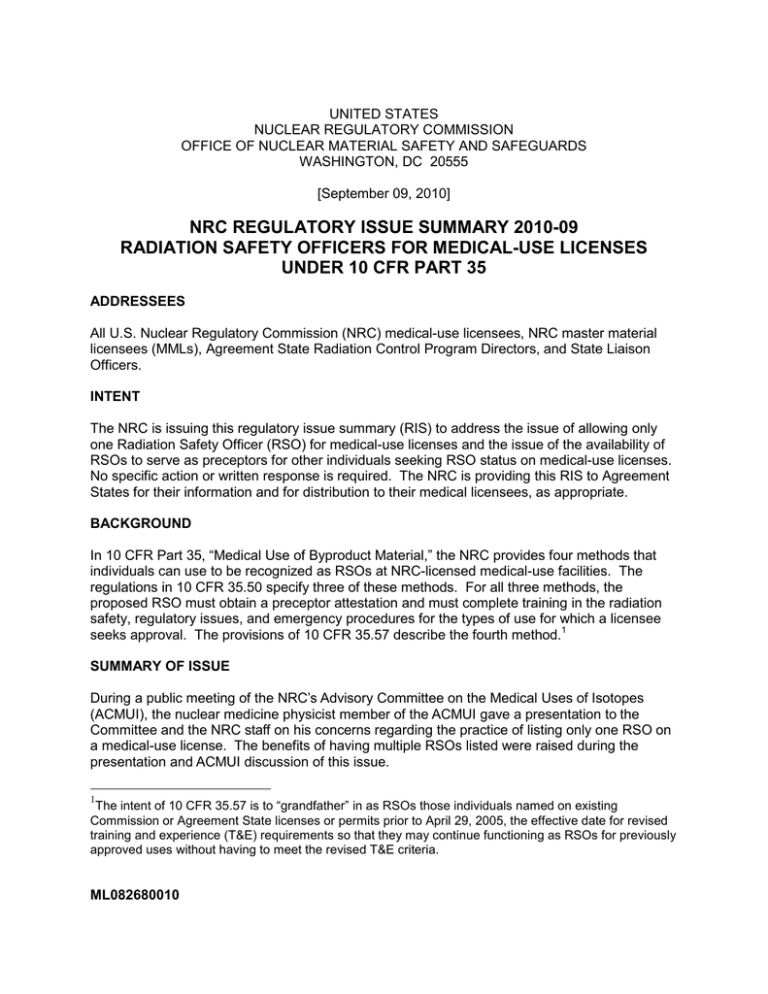
UNITED STATES NUCLEAR REGULATORY COMMISSION OFFICE OF NUCLEAR MATERIAL SAFETY AND SAFEGUARDS WASHINGTON, DC 20555 [September 09, 2010] NRC REGULATORY ISSUE SUMMARY 2010-09 RADIATION SAFETY OFFICERS FOR MEDICAL-USE LICENSES UNDER 10 CFR PART 35 ADDRESSEES All U.S. Nuclear Regulatory Commission (NRC) medical-use licensees, NRC master material licensees (MMLs), Agreement State Radiation Control Program Directors, and State Liaison Officers. INTENT The NRC is issuing this regulatory issue summary (RIS) to address the issue of allowing only one Radiation Safety Officer (RSO) for medical-use licenses and the issue of the availability of RSOs to serve as preceptors for other individuals seeking RSO status on medical-use licenses. No specific action or written response is required. The NRC is providing this RIS to Agreement States for their information and for distribution to their medical licensees, as appropriate. BACKGROUND In 10 CFR Part 35, “Medical Use of Byproduct Material,” the NRC provides four methods that individuals can use to be recognized as RSOs at NRC-licensed medical-use facilities. The regulations in 10 CFR 35.50 specify three of these methods. For all three methods, the proposed RSO must obtain a preceptor attestation and must complete training in the radiation safety, regulatory issues, and emergency procedures for the types of use for which a licensee seeks approval. The provisions of 10 CFR 35.57 describe the fourth method.1 SUMMARY OF ISSUE During a public meeting of the NRC’s Advisory Committee on the Medical Uses of Isotopes (ACMUI), the nuclear medicine physicist member of the ACMUI gave a presentation to the Committee and the NRC staff on his concerns regarding the practice of listing only one RSO on a medical-use license. The benefits of having multiple RSOs listed were raised during the presentation and ACMUI discussion of this issue. 1 The intent of 10 CFR 35.57 is to “grandfather” in as RSOs those individuals named on existing Commission or Agreement State licenses or permits prior to April 29, 2005, the effective date for revised training and experience (T&E) requirements so that they may continue functioning as RSOs for previously approved uses without having to meet the revised T&E criteria. ML082680010 RIS 2010-09 Page 2 of 3 From a historical perspective, it was noted that documentation that supports previous rulemakings does not provide the basis for NRC not allowing the listing of more than one RSO on a medical-use license. It was also noted that some Agreement States do allow for listing more than one RSO on a medical-use license by giving them designations such as “Assistant RSO” or “Deputy RSO.” During a public meeting, the ACMUI recommended by a unanimous vote that the NRC allow for listing more than one RSO on a medical-use license, with licensee management designating one RSO as the individual in charge. Although there may be policy reasons for allowing a medical-use license to include multiple RSOs, the wording of NRC’s current regulations2 does not allow such a practice. In addition, NRC regulations, as currently written, do not provide for naming an “Assistant RSO” or a “Deputy RSO” on a medical-use license or define the implications of such a title or the duties of such an individual. While there is no prohibition on a licensee choosing to have assistants to the RSO within their own organization, there are no regulatory provisions that would support recognizing or assigning specific duties to such an assistant in the license itself. Therefore, the ACMUI recommendation to allow medical-use licenses to list multiple RSOs and designate one of these RSOs as the RSO in charge cannot be accomplished under the current regulations. The NRC staff is considering the merits of initiating a rulemaking to allow the naming of multiple RSOs on a license against the direct cost and regulatory burden associated with such a rulemaking. In the interim, licensees may consider all individuals who meet the definition of RSO in 10 CFR 35.2 as persons who may serve as preceptors. These individuals include not only persons named as RSOs on licenses and master material licensee permits but also those certified individuals who meet the requirements in 10 CFR 35.50(a) or 10 CFR 35.50(c)(1) and who satisfy the requirement for recentness of training in 10 CFR 35.59. The definition of an RSO in 10 CFR 35.2 therefore allows for a larger pool of individuals who are qualified to serve as preceptors than that of only RSOs named on licenses and master material licensee permits. A licensee experiencing difficulty in obtaining the preceptor attestation for an authorized individual seeking RSO status or for an individual certified by a recognized board who is seeking RSO status can request an exemption under 10 CFR 35.19, “Specific Exemptions.” Licensees are reminded that each request for an exemption to the regulations is reviewed on a case-bycase basis, and that approval of an exemption request is not automatic. The review process involves both NRC Regional and Headquarters staff, so additional time, compared to that required for requests for license amendments which can be handled by Regional staff alone, will be required for processing exemption requests. BACKFIT DISCUSSION This RIS requires no action or written response. Any action on the part of addressees in accordance with the guidance contained in this RIS is strictly voluntary and, therefore, is not a backfit under any regulatory requirement in 10 CFR. Consequently, the staff did not perform a backfit analysis. 2 Specifically, the references to “the Radiation Safety Officer” that appear in 10 CFR 35.12(b)(1) and 10 CFR 35.24 (b), (e), (f), and (g). RIS 2010-09 Page 3 of 3 FEDERAL REGISTER NOTIFICATION A notice of opportunity for public comment on this RIS was not published in the Federal Register because this RIS is informational and does not represent a departure from current regulatory requirements. CONGRESSIONAL REVIEW ACT In accordance with the Congressional Review Act, the NRC has determined that this RIS is not a rule and therefore is not subject to the requirements of the Act. PAPERWORK REDUCTION ACT STATEMENT This RIS does not contain new or amended information collection requirements subject to the Paperwork Reduction Act of 1995 (44 U.S.C. 3501 et seq.). Existing information collection requirements were approved by the Office of Management and Budget, control number 3150-0010. PUBLIC PROTECTION NOTIFICATION The NRC may not conduct or sponsor, and a person is not required to respond to, a request for information or an information collection requirement unless the requesting document displays a currently valid Office of Management and Budget control number. CONTACT This RIS requires no specific action or written response. Please direct any questions to the technical contact listed below or the appropriate regional office. /RA/ Robert J. Lewis, Director Division of Materials Safety and State Agreements Office of Federal and State Materials and Environmental Management Programs Contact: Ronald Zelac, FSME (301) 415-7635 Email: Ronald.Zelac@nrc.gov Enclosure: List of Recently Issued Office of Federal and State Materials and Environmental Management Programs (FSME) Generic Communications RIS 2010-09 Page 3 of 3 FEDERAL REGISTER NOTIFICATION A notice of opportunity for public comment on this RIS was not published in the Federal Register because this RIS is informational and does not represent a departure from current regulatory requirements. CONGRESSIONAL REVIEW ACT In accordance with the Congressional Review Act, the NRC has determined that this RIS is not a rule and therefore is not subject to the requirements of the Act. PAPERWORK REDUCTION ACT STATEMENT This RIS does not contain new or amended information collection requirements subject to the Paperwork Reduction Act of 1995 (44 U.S.C. 3501 et seq.). Existing information collection requirements were approved by the Office of Management and Budget, control number 3150-0010. PUBLIC PROTECTION NOTIFICATION The NRC may not conduct or sponsor, and a person is not required to respond to, a request for information or an information collection requirement unless the requesting document displays a currently valid Office of Management and Budget control number. CONTACT This RIS requires no specific action or written response. If you have any questions about this summary, please contact the individual listed below or the appropriate regional office. /RA/ Robert J Lewis, Director Division of Materials Safety and State Agreements Office of Federal and State Materials and Environmental Management Programs Contact: Ronald Zelac, FSME (301) 415-7635 Enclosure: List of Recently Issued Office of Federal and State Materials and Environmental Management Programs (FSME) Generic Communications OFFICE NAME DATE OFFICE NAME DATE MSSA/MSEA RZelac 6/23/08 OIS TDonnell 8/31/09 ML082680010 MSSA/MSEA Tech. Editor MSSA/MSEA CFlannery QTE via e-mail AMcIntosh 9/9/08 9/17/08 9/24/08 OGC-NLO OGC-CRA MSSA BJones TRothschild JLuehman 6/23/09 6/23/09 5/19/10 OFFICIAL RECORD COPY MSSA/MSEA CEinberg 9/25/08, 4/21/10 MSSA RLewis 9/09/10 RIS 2009-09 Enclosure Page 1 of 2 List of Recently Issued Office of Federal and State Material and Environmental Management Programs Generic Communications Date GC No. 11/13/09 IN-2009-27 11/06/09 IN-2009-30 12/03/09 RIS-2009-15 01/21/10 RIS-2010-02 Subject Revised International Nuclear and Radiological Event Scale User’s Manual Addressees All holders of an operating license or construction permit for a power reactor, test reactor or research reactor issued under 10 CFR Part 50; holders of or applicants for an early site permit, standard design certification, standard design approval, manufacturing license, or combined license issued under 10 CFR Part 52; holders of a materials license, certificate, approval, or registration issued under 10 CFR Parts 30, 31 through 36, 39, 40, 61, 70, 71, 72, and 76; Agreement State Radiation Control Program Directors and State Liaison Officers. Findings from the NRC Initiative to Assess All U.S. Nuclear Regulatory Commission materials Materials Licensees’ Compliance with the licensees. All Agreement State Radiation Control NRC Decommissioning Requirements Program Directors and State Liaison Officers. National Source Tracking System Annual All licensees possessing Category 1 or Category 2 Inventory Reconciliation quantities of radioactive materials. All Radiation Control Program Directors and State Liaison Officers. The Global Threat Reduction Initiative (GTRI) All holders of operating licenses for nuclear power Federally Funded Voluntary Security reactors and research and test reactors Enhancements for High-Risk Radiological under the provisions of Title 10 of the Code of Material Federal Regulations (10 CFR) Part 50, “Domestic Licensing of Production and Utilization Facilities,” except those that have ceased operations and have certified that fuel has been permanently removed from the reactor vessel and have no spent fuel stored on-site. All U.S. Nuclear Regulatory Commission (NRC) fuel cycle facilities licensed under 10 CFR Part 40, “Domestic Licensing of Source Material” or 10 CFR Part 70, “Domestic Licensing of Special Nuclear Material” and gaseous diffusion plants certified under 10 CFR Part 76, “Certification of Gaseous Diffusion Plants.” All holders of site-specific licenses for independent spent fuel storage installations (ISFSIs) under the provisions of 10 CFR Part 72, “Licensing Requirements for the Independent Storage of Spent Nuclear Fuel, High-level Radioactive Waste, and Reactor-related Greater than Class C Waste,” and all holders of 10 CFR Part 50 licenses with ISFSIs under the general license provisions of 10 CFR Part 72. All NRC materials licensees authorized to possess Category 1 or Category 2 quantities of radioactive materials, under the provisions of 10 CFR Parts 30, “Rules of General Applicability to Domestic Licensing of Byproduct Material,” 40, and 70. RIS 2009-09 Enclosure Page 2 of 2 List of Recently Issued Office of Federal and State Material and Environmental Management Programs Generic Communications Date GC No. 05/25/10 RIS-2010-04 Subject Addressees Monitoring the Status of Regulated Activities All holders of operating licenses for nuclear power During a Pandemic reactors and research and test reactors under the provisions of Title 10 of the Code of Federal Regulations (10 CFR) Part 50, “Domestic Licensing of Production and Utilization Facilities,” except those that have ceased operations and have certified that fuel has been permanently removed from the reactor vessel and have no spent fuel stored on-site. All U.S. Nuclear Regulatory Commission (NRC) fuel cycle facilities licensed under 10 CFR Part 40, “Domestic Licensing of Source Material” or 10 CFR Part 70, “Domestic Licensing of Special Nuclear Material” and gaseous diffusion plants certified under 10 CFR Part 76, “Certification of Gaseous Diffusion Plants.” All holders of site-specific licenses for independent spent fuel storage installations (ISFSIs) under the provisions of 10 CFR Part 72, “Licensing Requirements for the Independent Storage of Spent Nuclear Fuel, High-level Radioactive Waste, and Reactor-related Greater than Class C Waste,” and all holders of 10 CFR Part 50 licenses with ISFSIs under the general license provisions of 10 CFR Part 72. All NRC materials licensees authorized to possess Category 1 or Category 2 quantities of radioactive materials, under the provisions of 10 CFR Parts 30, “Rules of General Applicability to Domestic Licensing of Byproduct Material,” 40, and 70. Note: This list contains the six most recently issued generic communications, issued by the Office of Federal and State Materials and Environmental Management Programs (FSME). A full listing of all generic communications may be viewed at the NRC public website at the following address: http://www.nrc.gov/reading-rm/doc-collections/gen-comm/index.html

